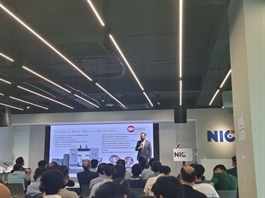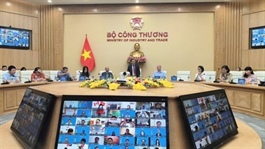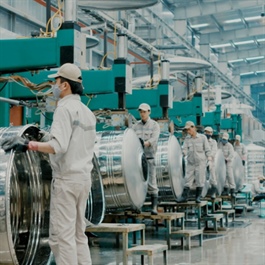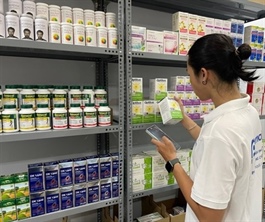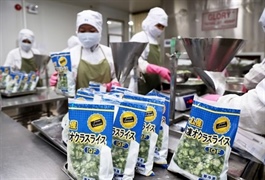Việt Nam has a unique opportunity to enhance its position in global supply chains
Việt Nam has a unique opportunity to enhance its position in global supply chains
Việt Nam has enjoyed a unique opportunity to enhance its position in global supply and value chains, vice chairman of the Việt Nam Chamber of Commerce and Industry (VCCI) Hoàng Quang Phòng said.
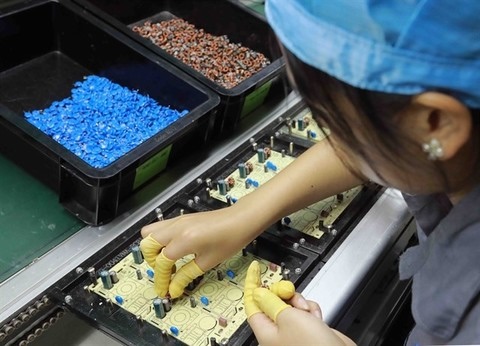
Electronic components are manufactured at a factory in Hải Dương Province. — VNA/VNS Photo Vũ Sinh |
During a conference last week in Hà Nội, Phòng said there is a shifting trend in global supply and value chains. In that strong transition, Việt Nam has been chosen by many countries, corporations and large enterprises globally as one of the strategic and potential investment destinations.
In the past, the Government has implemented many mechanisms and policies to promote the development of supply chains in which Việt Nam has strengths with top priority given to promoting technology applications and facilitating innovation.
Meanwhile, Việt Nam has signed 19 free trade agreements with leading important partners around the world. Of them, 16 have come into effect, creating great opportunities for the country to develop supply chains, he said.
On that basis, Vietnamese manufacturing and exporting enterprises have been restructuring their export goods, reducing the content of raw exports, and increasing the export of processed products and industrial products, bringing Vietnamese goods into many markets that ask for high-quality requirements and sustainable development standards.
Phòng also cited experience from South Korea, Taiwan (China) and Singapore, saying that the more domestic enterprises supplying products to multinational corporations, the deeper these countries and territories penetrate the global value chains.
The State aims to develop networks of first-tier (direct) suppliers and second-tier/third-tier suppliers (indirect suppliers to manufacturers) in the country, connecting them to the final assembly stages with the hope of directing those businesses to switch to producing more complex products and diversifying their baskets of export goods, the chairman said.
He suggested that in the future, support policies should come from the needs of domestic businesses. Businesses, especially those in important industries with great potential for linkages, should be the ones who offer the needs first, then the Government designs support programmes for them that can help them increase competitiveness, and improve capacities.
Nguyễn Tú Anh, director of the Centre for Economic Information, Analysis and Forecasting under the Central Economic Commission agreed that the trend of polarised globalisation unfolds opportunities for Việt Nam's economy and its business community.
Realising this is an opportunity for Việt Nam to participate more deeply in the expanding global supply chain, the Government has determined to focus on solving the bottlenecks of the economy, which is infrastructure facilities. The State and localities have been upgrading infrastructure, seaports, and highways.
However, the country has also encountered many challenges when deeply joining the global chain including the lack of skilled and unskilled workers, a large energy needed for rapid economic development and the trend of green transformation, Anh said.
Managing Director of Economica Vietnam Lê Duy Bình said applying environmental, social and governance (ESG) and social responsibility (CSR) standards, the circular economy and green economy models are no longer an option but have become an inevitable path for domestic businesses if they want to participate in the global supply chain.
For example, when participating in an international supply chain, enterprises need to not only comply with the host country's regulations but also meet international practices - such as the EU's carbon border adjustment mechanism or the EU Deforestation-free Regulation.
Bình said joining deeper into the global supply chain depends largely on businesses' efforts, with a focus given to better meeting commodity standards.
However, there are still some major bottlenecks in institutions and support policies. If these bottlenecks were removed, Vietnamese businesses would be more confident and steadfast when joining the global supply chain, Bình suggested.
Nguyễn Mạnh Hùng from RMIT University said he believed that green production is the key for businesses to improve their competitiveness and participate deeply in the supply chain.
Customers' green consumption behaviour is driving manufacturers and suppliers to adopt new standards and adjust operations. Customers, especially in developed countries, are increasingly more aware of the environmental impact in their purchasing decisions, Hùng said.
He cited a Rakuten Insight survey in 2023 as saying that, up to 84 per cent of consumers were willing to pay higher prices for sustainable products.
Việt Nam's major export markets, typically those in the EU, are implementing stricter environmental regulations and standards for products and services imported into the bloc.
Going green is no longer an option but a factor that determines the success of export orders, Hùng said, adding that from a supply chain perspective, buyers play a very important role in monitoring and collaborating to promote greening. They are the subjects leading the supply chain and promoting the green transformation process to ensure that the final products/services are consistent with market needs.








